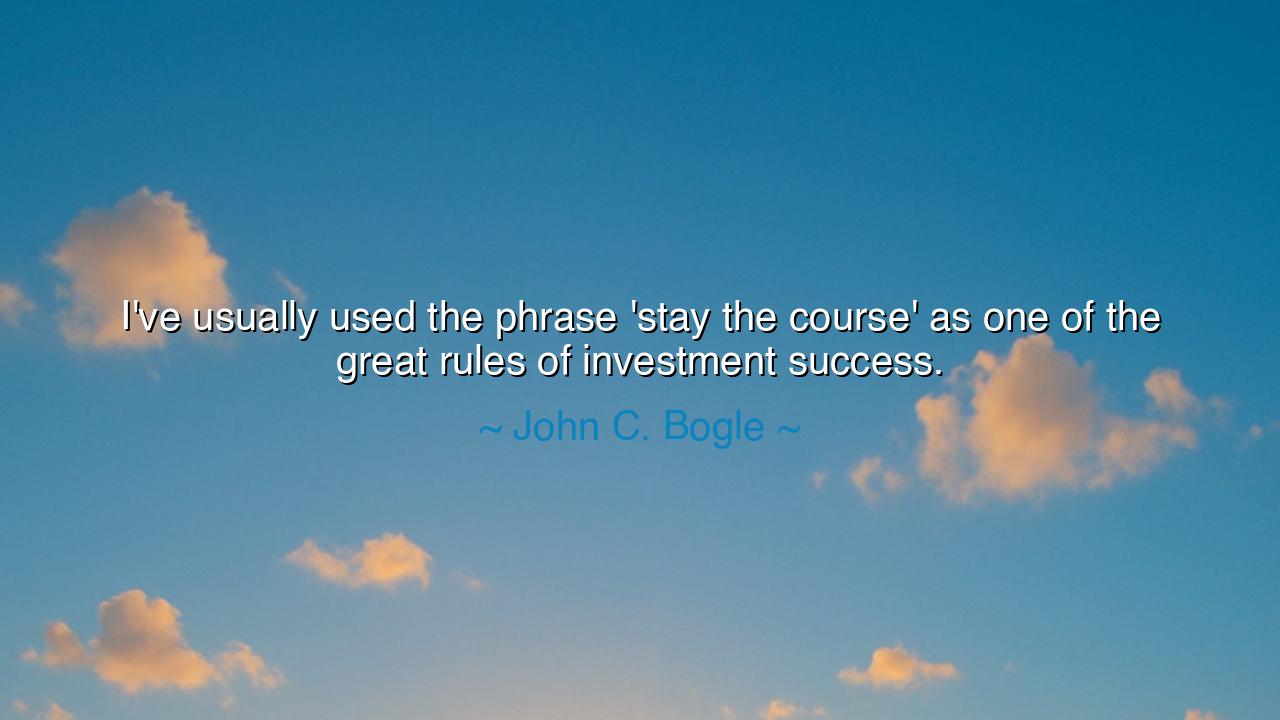
I've usually used the phrase 'stay the course' as one of the
I've usually used the phrase 'stay the course' as one of the great rules of investment success.






In the steady and enduring words of John C. Bogle, the founder of Vanguard and the champion of long-term wisdom, we hear this timeless counsel: “I’ve usually used the phrase ‘stay the course’ as one of the great rules of investment success.” Yet, as with all true wisdom, these words reach far beyond the world of finance. They speak to the very fabric of life itself—the call to persevere through doubt, to remain steadfast in one’s purpose when storms rise and temptations whisper of quicker paths. To “stay the course” is not merely an investment strategy; it is a philosophy of endurance, an act of faith in time and truth.
The origin of this saying lies in the deep currents of both history and Bogle’s own experience. In the turbulent seas of the financial world—where fortunes are made and lost, and fear and greed wrestle in endless combat—Bogle stood apart as a voice of calm reason. When others chased fleeting trends, he built his creed upon the rock of patience. Through the creation of the index fund, he taught that success comes not from constant motion, but from constancy itself. In an age obsessed with speed, he reminded the world that true growth, whether in wealth or wisdom, is the fruit of discipline, not frenzy.
But the phrase “stay the course” is older still. It comes from the language of navigation, from the mariners who faced vast oceans with only stars and courage to guide them. To “stay the course” meant to hold to the plotted path even as waves battered the ship and winds sought to drive it astray. The ancients understood this well. A sailor who changed direction with every gust would perish; only the one who trusted his compass and endured the tempest would reach his destination. Bogle borrowed this wisdom of the seas, applying it to the ocean of markets—and, unwittingly, to the voyage of human life.
Consider the story of Odysseus, the hero of Homer’s Odyssey. For ten long years he wandered from shore to shore, beset by storms, monsters, and the temptations of ease. Yet always, he remembered Ithaca—his home, his purpose—and though the journey broke ships and scattered men, he stayed the course. His path was not straight nor his progress swift, but his constancy brought him home. So it is in investing, in art, in love, and in life: the reward belongs not to those who move fastest, but to those who remain faithful to their direction when others lose their way.
In the world of markets, as in the heart of man, fear is the great deceiver. When times grow dark—when values fall and uncertainty reigns—the weak abandon their purpose. They sell too soon, despair too quickly, and undo the work of years in a single moment of panic. Yet the wise, as Bogle taught, do not let emotion steer their course. They trust the long horizon; they understand that turbulence is not destruction but movement, that the tide returns if only one has the courage to wait. In this way, Bogle’s philosophy becomes more than economic—it becomes moral. To stay the course is to master oneself, to triumph not by domination but by patience.
The meaning of Bogle’s words, then, is simple yet profound: endurance is the highest form of intelligence. To commit to a principle and remain loyal to it, through seasons of gain and loss alike, is the path to greatness. This applies not only to investors but to all seekers—to the writer who toils through rejection, to the student who studies though weary, to the parent who loves without recognition. In every domain, success is the child of consistency. The world will always tempt us with distraction and despair, but the one who stays the course builds something that time itself cannot erode.
The lesson is clear: choose your path with wisdom, and once chosen, walk it with faith. There will be storms—losses, doubts, changes—but do not abandon your compass. Do not let impatience steal what perseverance could have won. Whether in markets or in life, stay the course. Let your progress be slow if it must, but let it be steady. Each small step, taken with resolve, carries you farther than a thousand leaps taken in haste.
So, my listener, remember this teaching of John C. Bogle—a man who turned simplicity into strength, and patience into prosperity. When the winds of fear rise, hold to your chart. When others falter or flee, remain firm. For time, that ancient ally of the steadfast, will reward those who trust it. And when the journey is long and the sea uncertain, whisper to yourself as the sailors and sages once did: Stay the course. For in those three words lies the secret not only to investment success, but to the art of living well.






AAdministratorAdministrator
Welcome, honored guests. Please leave a comment, we will respond soon